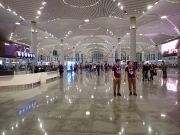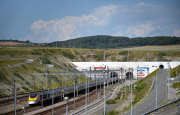
Thank you, Madam Chair. Firstly, I would like to thank Ms Herasymchuck for her statement. Madam Chair, since we last met in this Council, millions across the OSCE region have welcomed the
arrival of Spring; celebrating new life, rebirth and community. While we may look ahead to warmer, brighter days, for many Ukrainians the upcoming Easter celebrations will be overshadowed for a second year by Russia’s destructive and unprovoked invasion.
Thousands of Ukrainian families will be missing loved ones from their tables and family gatherings in the coming days: those killed by Russian invaders; those serving to defend Ukraine; unlawfully detained persons and all those forced from their homes. This Easter, according to the Yale Humanitarian Research Lab, over 6,000 Ukrainian children will be in Russia’s custody, without their parents – some as far as 4,000 miles from their homes. We await the Moscow Mechanism report on this latest cruelty from Russia.
This devastation also includes families grieving in Russia. Thousands of Russian soldiers have senselessly lost their lives in Ukraine – many of them recruited from minority communities, in Russia’s poorest regions. Poorly trained, ill equipped and with non-existent leadership, these men – young and old – were led to their deaths by Moscow’s lies and propaganda. The Russian leadership has shown a complete disregard for the lives of its citizens - to fight a war that many do not understand or believe in.
Spring also marks a busy time for agricultural producers across the OSCE region. However, in Ukraine, the simple act of tending to the land could result in serious injury or death. More than 5 million hectares of Ukraine’s farmland has been damaged in the war – an area larger than Slovakia. Vast areas will need to be cleared of mines and unexploded ordnance and re-cultivated. Russian forces stole or destroyed agricultural equipment and left seed and crops to rot, while bombs, bullets, starvation and disease killed hundreds of thousands of animals and millions of poultry birds. We continue to see the impact of Russia’s actions on world food prices and on the most food-insecure communities around the globe.
Every day, ordinary Ukrainians live under the constant threat of attack while trying to go on with their lives. This weekend residential areas, including in Kramatorsk and Kupiansk, were the target of Russian shelling and rocket attacks, which claimed more innocent lives including a little 11-year-old girl and her father. Russian attacks on Zaporizhzhia Oblast on Sunday resulted in a further three deaths. The relentless loss of life and devastation caused by Russia’s aggression since February 2022 is incomprehensible.
We will remember each one of these lives taken. We will not forget the names of the children separated from their parents. We will honour those who have given their lives and livelihoods in the defence of their country. Time and again, we have called on Russia to end this war, to end the suffering to Ukraine, to its own people and to all affected around the world. However, it is clear Russia’s political leadership does not want peace.
Madam Chair, there is hope. The Ukrainian people have demonstrated repeatedly that they will not give up their right to freedom and a democratic future; they will not bow in the face of Russian aggression. And Ukraine’s friends will not give up either. As evidenced by the wide-ranging diplomatic, economic, military and humanitarian assistance for Ukraine by its partners, Russia should not harbour any illusions that this support will diminish. It will not. Ukraine will have peace; a just and lasting peace on Ukraine’s terms; a peace that respects Ukraine’s sovereignty and territorial integrity; and a peace that restores the stability and security of Europe and the wider global community. And we will be standing by them. Photo by Immanuel Giel, Wikimedia commons.






































